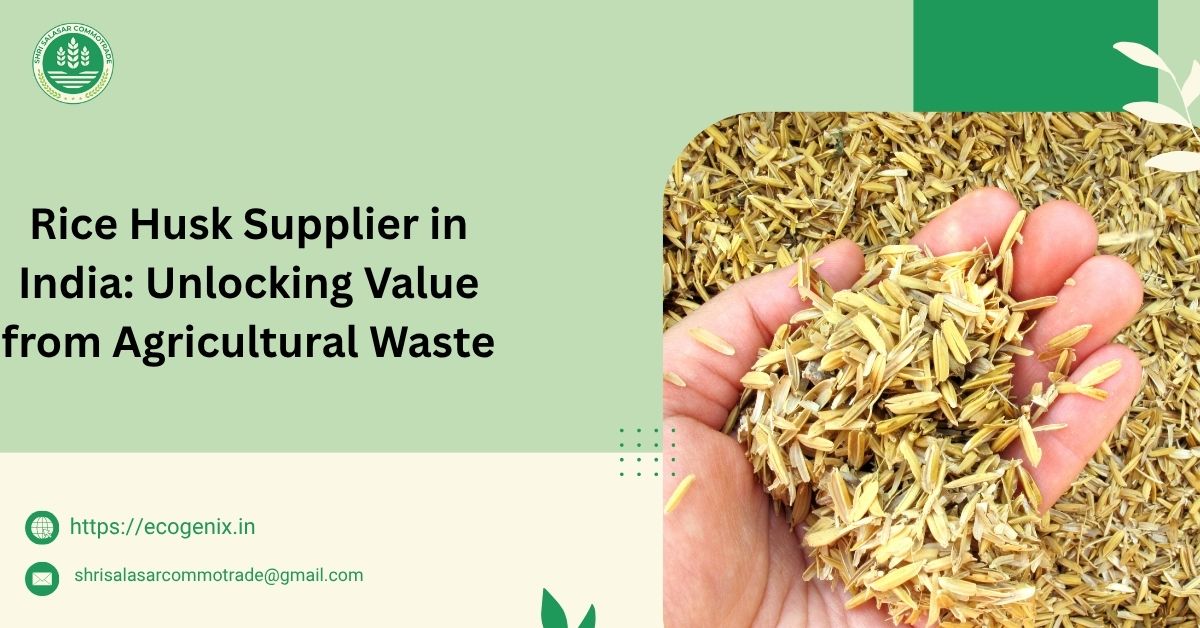Agriculture in India is not just about growing crops; it’s also about finding new opportunities in what’s often discarded. One such valuable byproduct is rice husk, the hard protective outer layer of rice grains. While it was once considered waste, rice husk today powers energy plants, builds construction materials, feeds livestock, and even enters cosmetics and chemicals.
Behind this transformation lies a growing sector: rice husk suppliers. These businesses collect, process, and distribute rice husk to industries that rely on it as a low-cost, eco-friendly input.
What is Rice Husk?
Rice husk (also known as rice hull) is the outermost layer that covers the rice grain during harvest. It is removed during the milling process and makes up around 20% of the total paddy weight.
Instead of burning it or dumping it in landfills, modern industries use rice husk for:
- Fuel (biomass and thermal energy)
- Construction (cement and bricks)
- Livestock bedding and feed
- Fertilizer or compost material
- Silica extraction
- Industrial raw materials
Why Rice Husk Is in High Demand
Rice husk is considered a renewable and sustainable resource. With India producing over 120 million tonnes of rice annually, the country generates about 24 million tonnes of rice husk every year.
Industries increasingly turn to rice husk due to:
- Low Cost– Much cheaper than conventional fuel or construction material.
- Eco-Friendly– A cleaner alternative to fossil fuels and synthetic materials.
- High Silica Content– Useful in cement, ceramics, and silicon-based industries.
- Thermal Insulation– Its insulating properties are ideal for the energy and steel sectors.
- Agricultural Waste Utilization– Reduces environmental impact and pollution from burning.
Uses of Rice Husk Across Industries
Power & Energy
- Rice husk is widely used as biomass fuel in thermal and power plants.
- It can be burned directly or converted into rice husk pellets for clean combustion.
Construction
- Used to make Rice Husk Ash (RHA), which is rich in silica.
- RHA is mixed with cement and concrete to enhance strength and reduce cost.
- Lightweight bricks and insulation boards use treated husk.
Animal Husbandry
- Acts as bedding for poultry and livestock due to its absorbent nature.
- Also used as a fiber supplement in animal feed after treatment.
Fertilizers and Soil Enhancers
- When composted or biocharred, rice husk improves soil fertility and water retention.
Silica and Chemical Industry
- Silica extracted from rice husk is used in rubber, paint, ceramics, and cosmetics.
Textile and Packaging
- Eco-friendly packaging and biodegradable fabric composites.
The Role of Rice Husk Suppliers
Rice husk suppliers act as connectors between rice mills and end-user industries. Their responsibilities go beyond just selling:
- Collect rice husk from multiple sources (mills, farms)
- Store and process it (drying, sieving, compacting)
- Ensure consistent quality and specifications
- Deliver in bulk via trucks, containers, or pallets
- Manage logistics and supply chain challenges
- Offer customized husk products (raw, ash, pelletized)
Types of Rice Husk Products Supplied
Raw Rice Husk: Unprocessed husk collected from rice mills
Powdered Rice Husk: Ground for use in filler, insulation, or animal feed
Rice Husk Ash (RHA): Produced by burning husk under controlled conditions
Pelletized Rice Husk: Compressed biomass fuel is used in boilers and power plants
Treated/Washed Husk: Used in animal bedding or as horticultural filler
Who Buys from Rice Husk Suppliers?
Industries that frequently require rice husk:
- Biomass power plants
- Cement manufacturers
- Brick kilns and construction companies
- Fertilizer and compost producers
- Poultry and dairy farms
- Ceramic and rubber industries
- Agricultural nurseries
- Exporters of eco-friendly packaging
How Rice Husk Supply Helps India’s Green Goals
- Reduces air pollution– Prevents stubble and husk burning in farms.
- Promotes clean energy– Biomass-based energy helps reduce dependence on coal.
- Supports circular economy– Turns agricultural waste into usable industrial input.
- Creates rural jobs– Local sourcing, processing, and supply create employment.
- Drives carbon neutrality– Supports carbon credit generation and low-emission manufacturing.
Future Trends in Rice Husk Supply
- Export Expansion: Southeast Asia, the Middle East, and Europe demand processed husk products.
- Technological Advancements: Pellet machines, moisture sensors, and mobile husk units.
- Government Support: More schemes under Startup India, PM Kusum, and Waste to Wealth Missions.
- Online Platforms: Digital B2B portals and marketplaces for bulk husk orders.
- Customized Applications: Husk-based insulation, 3D printing material, organic mulch, etc.
Note:- Purchase affordable rice husk ash in India
Conclusion
Rice husk, once a neglected agricultural waste, is now a powerful resource driving green energy, sustainable construction, and rural entrepreneurship. As a rice husk supplier, you don't just run a business; you participate in solving pollution, energy, and economic challenges.
With increasing demand across sectors, growing environmental consciousness, and government incentives, the time to invest in the rice husk supply business is now.





Comments